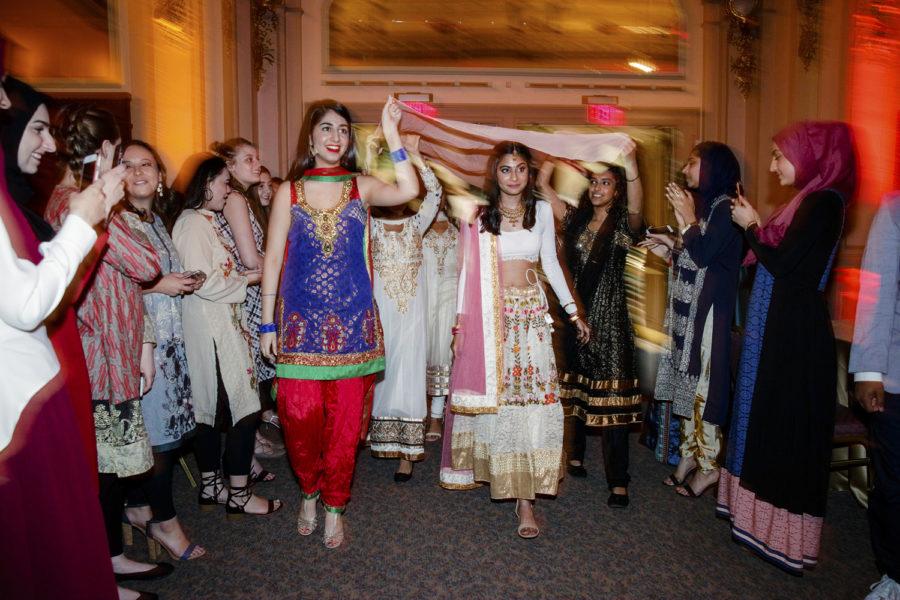Two first-year students exchanged vows in the William Pitt Union ballroom Saturday night — but all in good fun.
The bride and groom were volunteer participants in the Pitt Pakistani Student Association’s second annual Mock Shaadi event. Awash in shades of red, yellow and pink, the ballroom was transformed into a wedding venue for the pretend marriage, which showed what decor, clothing, food, music and traditions are involved in a traditional South Asian marriage.
The open space was outfitted with tall cocktail tables draped in red silk, crystal chandeliers and a traditionally decorated stage complete with two chairs for the bride and groom, facing outward toward the guests.
Haniah Zaheer, a junior psychology major and president of the PSA, knew she wanted to host Mock Shaadi again after its success last year. She and 20 other members — several from non-Pakistani backgrounds — began planning the event after winter break.
“We accept all different types of students to our club. We don’t want to restrict it to people who are only Pakistani,” Zaheer said. “It’s really showing our culture and allowing people to understand what we do and our traditions.”
Zaheer also said she wanted everyone to enjoy the event and familiarize themselves with the traditions surrounding Pakistani weddings.
“In the time we’re in right now, it’s good to make people more aware,” Zaheer said. “A lot of kids in our Pakistani group are Muslim as well. It’s more of a Muslim type of wedding.”
Accompanied by his friends, this year’s groom, Danyal Quraishi, a neuroscience major, entered the room wearing a gold sherwani — a long silk embroidered gown — along with a red cap with a strip of long fabric that wrapped around his neck and fell onto his back. Board members from the PSA had voted for him to have the position.
“A lot of my friends never experienced a shaadi before — let alone say it right,” Quraishi said. “So I just thought it’d be really great to show them what one would be like through this Mock Shaadi.”
The South Asian Student Association chose biology major Kamya Menon to be the bride. Menon followed Quraishi as her friends held a sheer tapestry with gold stripes over her head. Menon wore a lehenga, a heavy two-piece floral-embroidered outfit with gold trim on the bottom, accented by a gold necklace and headpiece.
“I really enjoyed the experience,” Menon said. “It was cool getting to be a part of the shaadi and to see the coming together of two cultures.”
The couple joined each other on the stage, where they took their seats before sharing their vows — mostly inside jokes between the two friends — and exchanging candy rings.
Erin Calvimontes, a Highland Park wedding planner who specializes in South Asian weddings, helped oversee the creation of the event. Calvimontes became involved in planning the pretend wedding at Pitt when she saw a photo on Facebook of the first Mock Shaadi Pitt and Penn State hosted together two years ago and reached out offering her services.
“I said, ‘Please let me help you make this look awesome, we have to show up Penn State,’” Calvimontes said.
Zaheer expressed how fortunate the PSA was to get in touch with Calvimontes, who works for the group Divine Celebrations.
“That was literally amazing, because we would’ve just had lights on the wall,” Zaheer said. “She literally [brought] everything — a videographer, photographers, photo booths, lights and a fake cake.”
After Quraishi and Menon’s friends made speeches to toast their faux wedding, the evening unfolded with a catered dinner from Salem’s Market and Grill consisting of white rice, chicken and vegetarian dishes. There were also multiple performances by Pitt dance groups such as Mastana, Controlled Chaos, C-Flat Run and SASA.
PSA members also performed three pieces inspired by Bhangra — a traditional type of dance incorporating modern rhythms and performed during festivals and weddings in Pakistan.
The dancers faced the bride and groom while performing their dance numbers, incorporating some of what happens during the Mehndi — one of the pre-wedding ceremonies done the day before a shaadi in a venue covered in flowers, with the bride and groom in light colored clothes of yellow or green.
Guests were eager to put their Bhangra dance skills on display as the dance floor opened up to them for the remainder of the night.
According to Calvimontes, the evening was similar to a real Pakistani shaadi, from the bridal entrance to the ring exchange — minus the fake rings and cake that were used because real ones were too expensive.
Calvimontes and her team spent about 15 hours turning PSA’s vision into reality — and they never missed a beat, even as the the choreographed routines came to a close and the bride and groom pretended to cut the fake five-tier cake.
Noelle Eghbali, a first-year neuroscience major who came to the event to support her best friend, the groom, said as someone of both Iranian and Chinese heritage, she doesn’t have a lot of Iranian friends. She appreciated the blending of Indian and Pakistani students at this event and their shared culture.
“People have that stereotype that if you’re not white, you just don’t have a lot of fun,” Eghbali said. “I think it brings a lot of awareness to humanity.”
According to Eghbali, the evening was as much about entertaining the guests and showing all in attendance a good time as it was about about celebrating the shaadi wedding ritual.
“I’ll be here next year even if my best friend isn’t the groom,” Eghbali said.



